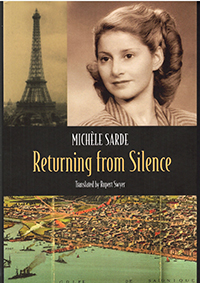Returning from Silence: Jenny’s Story by Michèle Sarde (translated by Rupert Swyer); Chicago: Swan Isle Press; © 2022; ISBN 9781736-189306; 329 pages; $30.

 SAN DIEGO – After years of running and hiding during the Holocaust, Jenny Benrey, decided that her five-year-old daughter, the future novelist Michèle Sarde, should be baptized in the Catholic Church. So many of her relatives and friends had disappeared in the Nazi Holocaust! But later, when it came time for Michèle’s confirmation, Jenny could not bring herself to complete her abandonment of Judaism. Michèle was withdrawn from the confirmation class, thereafter living neither as a practicing Jew nor as a Catholic. And the Holocaust that had prompted Jenny’s impulses became a forbidden subject, enveloped in silence.
SAN DIEGO – After years of running and hiding during the Holocaust, Jenny Benrey, decided that her five-year-old daughter, the future novelist Michèle Sarde, should be baptized in the Catholic Church. So many of her relatives and friends had disappeared in the Nazi Holocaust! But later, when it came time for Michèle’s confirmation, Jenny could not bring herself to complete her abandonment of Judaism. Michèle was withdrawn from the confirmation class, thereafter living neither as a practicing Jew nor as a Catholic. And the Holocaust that had prompted Jenny’s impulses became a forbidden subject, enveloped in silence.
However, as an adult Sarde in drips and drabs would learn from her mother about the fate of family members. That ignited a passion to research her Sephardic family’s history, dating back to the expulsion from Spain in 1492, to more than 400 years of life in Salonika in the Ottoman Empire, and, from the end of World War I to the present, in France.
Sarde, a diligent researcher, gave special attention to the Holocaust years, and quite movingly, to the immediate years thereafter, when remnants of the family and their fellow Jewish expats from Salonika waited, inquired, feared, and mourned the fate of those who had been taken by the Nazis away from them.
Given the silence that had enshrouded these stories for much of Sarde’s life, every morsel, every family connection, took on the added importance of being a discovery. If the stories that Sarde persuaded her mother to tell at times seemed unremarkable, consider them nevertheless to be important literary artifacts. Memories of those lives that would have been erased without a trace were now, through Sarde’s efforts, resurrected.
Given Sarde’s vocation as a novelist, she imagined conversations here and there that might have occurred among her ancestors. This had the effect of transforming a family genealogy into historical fiction. It also made Returning from Silence more readable than might otherwise have been the case.
Readers will learn about the position of Jews in the Ottoman Empire, and how the Hellenization of Salonika left them feeling uneasy about their positions after having lived there for more than four centuries. They also will learn about the joys of living in France during the interwar years, and how during World War II they were brutally separated from each other, all too many of them to perish in the gas chambers of Auschwitz. Finally, they will learn about their reorientation to peace and French citizenship following the defeat of the Nazis.
It is not always the easiest reading, but it is worth the effort.
*
Donald H. Harrison is editor emeritus of San Diego Jewish World. He may be contacted via donald.harrison@sdjewishworld.com